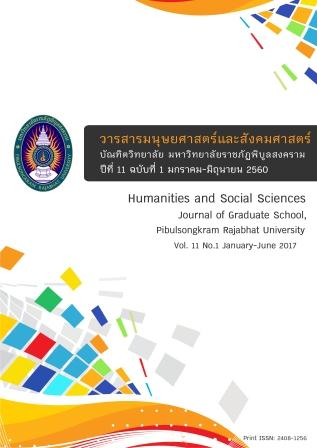การพัฒนาความสามารถในการคิดเชิงวิทยาศาสตร์ของนักเรียน ชั้นประถมศึกษาปีที่ 5 โรงเรียนบ้านวังพรม อำเภอวังทอง จังหวัดพิษณุโลก โดยการจัดการเรียนรู้แบบวัฏจักรการสืบเสาะหาความรู้ 7 ขั้น (7E)
Keywords:
การจัดการเรียนรู้แบบวัฏจักรการสืบเสาะหาความรู้ 7 ขั้น (7E), การคิดเชิงวิทยาศาสตร์, ความพึงพอใจต่อการจัดการเรียนรู้แบบวัฏจักรการสืบเสาะหาความรู้ 7 ขั้น (7E),Abstract
บทคัดย่อ
การวิจัยนี้มีจุดมุ่งหมายเพื่อ 1) เพื่อศึกษาความสามารถในการคิดเชิงวิทยาศาสตร์ของนักเรียน
ชั้นประถมศึกษาปีที่ 5 โรงเรียนบ้านวังพรม อำเภอวังทอง จังหวัดพิษณุโลก ก่อนเรียนและหลังเรียนโดยใช้การจัดการเรียนรู้แบบวัฏจักรการสืบเสาะหาความรู้ 7 ขั้น (7E) 2) เพื่อเปรียบเทียบความสามารถในการคิดเชิงวิทยาศาสตร์ ของนักเรียนชั้นประถมศึกษาปีที่ 5 ก่อนเรียนและหลังเรียน โดยใช้การจัดการเรียนรู้แบบวัฏจักรการสืบเสาะหาความรู้ 7 ขั้น (7E) 3) เพื่อศึกษาความพึงพอใจของนักเรียนชั้นประถมศึกษาปีที่ 5 ที่มีต่อการจัดการเรียนรู้แบบวัฏจักรการสืบเสาะหาความรู้ 7 ขั้น (7E) กลุ่มตัวอย่างที่ใช้ในการวิจัยเป็นนักเรียน
ชั้นประถมศึกษาปีที่ 5 โรงเรียนบ้านวังพรม อำเภอวังทอง จังหวัดพิษณุโลก ภาคเรียนที่ 2 ปีการศึกษา 2558 จำนวน 15 คน เครื่องมือที่ใช้ในการวิจัยครั้งนี้ คือ แผนการจัดการเรียนรู้แบบวัฏจักรการสืบเสาะหาความรู้
7 ขั้น (7E) หน่วยการเรียนรู้ เรื่อง สมบัติของวัสดุในชีวิตประจำวัน กลุ่มสาระการเรียนรู้วิทยาศาสตร์
ชั้นประถมศึกษาปีที่ 5 แบบทดสอบวัดความสามารถในการคิดเชิงวิทยาศาสตร์ กลุ่มสาระการเรียนรู้วิทยาศาสตร์ ชั้นประถมศึกษาปีที่ 5 และแบบสอบถามความพึงพอใจ วิเคราะห์ข้อมูล ด้วยค่าร้อยละ ค่าเฉลี่ย ค่าส่วนเบี่ยงเบนมาตรฐาน และหาค่า t –test แบบ Dependent ด้วยโปรแกรมคอมพิวเตอร์สำเร็จรูป
ผลการวิจัยพบว่า 1) ความสามารถในการคิดเชิงวิทยาศาสตร์ของนักเรียนชั้นประถมศึกษาปีที่ 5 โรงเรียนบ้านวังพรม อำเภอวังทอง จังหวัดพิษณุโลก โดยใช้การจัดการเรียนรู้แบบวัฏจักรการสืบเสาะหาความรู้ 7 ขั้น (7E) ก่อนเรียนอยู่ในระดับปรับปรุง หลังเรียนอยู่ในระดับดี ซึ่งระดับความสามารถในการคิดเชิงวิทยาศาสตร์ของนักเรียนหลังเรียนอยู่ในระดับสูงขึ้น 2) ความสามารถในการคิดเชิงวิทยาศาสตร์ของนักเรียน
ชั้นประถมศึกษาปีที่ 5 โรงเรียนบ้านวังพรม อำเภอวังทอง จังหวัดพิษณุโลก โดยใช้การจัดการเรียนรู้แบบวัฏจักรการสืบเสาะหาความรู้ 7 ขั้น (7E) หลังเรียนสูงกว่าก่อนเรียนอย่างมีนัยสำคัญทางสถิติที่ระดับ .05 3) ความ
พึงพอใจของนักเรียนที่มีต่อการจัดการเรียนรู้แบบวัฏจักรการสืบเสาะหาความรู้ 7 ขั้น (7E) อยู่ในระดับมาก
Abstract
The purposes of this research were to 1) Study the scientific thinking abilities of grade 5th students banwangprom school wangthong district, phitsanulok before and after being taught using 7E learning Inquiry cycle model. 2) compare scientific thinking abilities of grade 5th students banwangprom school wangthong district, phitsanulok before and after being taught using 7E learning Inquiry cycle model. 3) Study students’ satisfaction banwangprom school wangthong district, phitsanulok towards the application of the 7E learning Inquiry cycle model. The population were 15 grade 5th students banwangprom school wangthong district, phitsanulok Province during the second semester of the academic year 2015. The research instruments consisted of the lesson plans with 7E Learning Inquiry Cycle Model for grade 5th students on the topic of inventory property in the every day life. Scientific thinking ability test of grade 5th students. Satisfaction questionnaire of grade 5th students towards the application of the 7E learning Inquiry cycle model. The statistics analysis employed were percentage, mean, standard deviation and t–test dependent using computer program.
The research finding revealed that 1) Scientific thinking abilities of grade 5th students banwangprom school wangthong district, phitsanulok before was in update and after student was in good. 2) Study the level scientific thinking abilities after being taught using 7E learning Inquiry cycle model were higher statistically significant than before at the level of .05
3) Students’ satisfaction towards the 7E learning Inquiry cycle model wear at a very high agreement level.
Downloads
Published
How to Cite
Issue
Section
License
Any articles or comments appearing in the Journal of Humanities and Social Sciences, Rajabhat Phibulsongkram University, are the intellectual property of the authors, and do not necessarily reflect the views of the editorial board. Published articles are copyrighted by the Journal of Humanities and Social Sciences, Rajabhat Phibulsongkram University.









